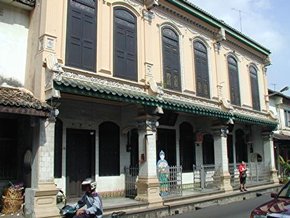Malacca
|
|
| |||||
| State motto: Bersatu Teguh | |||||

| |||||
| Capital | Malacca Town | ||||
| Governor | Tun Datuk Seri Utama Mohd. Khalil b. Yaakob | ||||
| Chief Minister | YAB Datuk Seri Hj. Mohd Ali b. Mohd Rustam | ||||
| Area | 1,650 km2 | ||||
| Population - Estimated | 648,500 | ||||
| State anthem | Melaka Maju Jaya | ||||
Malacca is also the name of the largest village on Car Nicobar, the northernmost of the Nicobar Islands.
Malacca, also widely known as Melaka in Malay, Jawi: ملاك) is a state of Malaysia, located in the southern part of the Malay Peninsula, on the Straits of Malacca. The state's capital is also called Melaka or Malacca.
Although the first Malay sultanate started in Malacca, the state has no Sultan today. Instead, the head of state is the Governor or Yang Di-Pertuan Negeri, who is appointed by the head of state, the Yang di-Pertuan Agong after consulting the Chief Minister of Malacca. Currently, the Governor of Malacca is Tun Datuk Seri Utama Mohd. Khalil b. Yaakob, the former Minister of Information of Malaysia. While, the Menteri Besar or Chief Minister of the state is YAB Datuk Seri Hj. Mohd Ali b. Mohd Rustam.
| Contents |
History
Malacca was founded by Parameswara, a Srivijayan prince who left Sumatra in 1396. He converted to Islam in 1414, thus creating a Sultanate of Malacca in order to further his enmity with the Majapahit Empire. What started as a fishing village then grew into the most important port in the region, serving as a stopping point for China-India trade during the two monsoon periods. Because of its strategic location, Malacca was an important outpost for Zheng He's spectacular exploration fleet. Mass settlement of Chinese, mostly from the imperial fleet occured during the reign of Parameswara, in the vincinity of Bukit China area, which has among the best Feng Shui in Malacca then.
A cultural result of the vibrant trade was the expansion of the Peranakan people, who spread to other major settlements in the region.
Malacca was occupied on August 24th 1511 by the Portuguese viceroy of India, Alfonso d'Albuquerque and became a strategic base for Portuguese expansion in the East Indies. The Jesuit missionary Francis Xavier spent several months in Malacca in 1545, 1546 and 1549. In 1641 the Dutch defeated the Portuguese to capture Malacca with the help of the Sultan of Johore.
Malacca was ceded to the British in the Anglo-Dutch Treaty of 1824. From 1826 to 1946 Malacca was governed, first by the British East India Company and then as a Crown Colony. It formed part of the Straits Settlements, together with Singapore and Penang. After the dissolution of this crown colony, Malacca and Penang became part of the Malayan Union, which later became Malaysia.
Geography
Malacca is on the southwest coast of the Malay peninsula opposite Sumatra, with the states of Negeri Sembilan to the north and Johor to the east.
- Land area: 1650 sq km
- Population (2001): 648,500
- State Capital: Malacca Town
Demographics
Malays (50%) and Chinese (40%) constitute the two dominant ethnic groups, with the ethnic Indians constituting a sizeable minority. There is still a Eurasian minority of semi-Portuguese descent in Malacca, who speak an ancient Portuguese creole called Cristao, who are also simply known as Papia Kristang.
Even to this very day, many of the ancient traditions passed down since the Portuguese occupation are still practised, i.e. "Intrudu" (water festival that marks the beginning of the Catholics fasting season, the season of Lent), "branyu" (traditional dance), "santa cruz" (a yearly fiesta of street celebrations).
Malacca is also the stronghold of the Straits Chinese, known as Peranakan, many of whom settled in Malacca during the heyday of the India-China trade. There are several Chinese temples and buildings in the city of Malacca and its surroundings. A story tells of a beautiful Chinese princess named Hang Li Poh (汉丽宝), who was encorted by Zheng He to Malacca to be wed to the Sultan Mansur Shah, after accepting the conversion to Islam.
In order to keep the princess from homesickness, an entourage of five hundred maidens (and their attendants) were also sent in her company by order of the Chinese emperor. According to local legend, these maidens eventually married locally and settled in an area called Bukit Cina or Chinese Hill in Malacca. It is not clear whether this story had any historical bearing, however it is more likely that the Chinese who settled are Malacca are either traders or sailors. One thing for certain is that Malacca was often used as a port of call during Zheng He's many voyages from China.
A small group of local Indians, known as the Chitty, can be also found.
Transportation
- Tampin, a town 30km north of Malacca town, is the nearest train station that serves Malacca. There were railway tracks from Tampin to Melaka before WW II but was dismantled by the Japanese during the war for the construction of the infamous Burmese Death Railway. It was never rebuilt after the war though traces of the line remain.
- The North-South highway in Malaysia's closest exit to Malacca is the Ayer Keroh exit.
- Malacca has a bus station with regular bus services to Kuala Lumpur, Johor Bahru and other places in Malaysia.
- Malacca also has an airport at Batu Berendam which today mainly serves chartered flights from around the region.
- Another exit from the North-South highway is the Jasin exit from where one can travel to Jasin or Merlimau.
Related articles
External link
- Official Melaka government website (http://www.melaka.gov.my/)
- Malaysia Travel Guide: Melaka (http://www.cuti.com.my/?f=guide_melaka.htm)
- Malacca's Colonial Past (http://www.malacca.org/)
- Portuguese rule in Malacca (http://www.colonialvoyage.com/malacca.html)
- Dutch rule in Malacca (http://www.colonialvoyage.com/malaccaNL.html)
- Jasin district council website (http://www.mdjasin.gov.my/)
| States and Federal Territories of Malaysia | 
| ||||
|---|---|---|---|---|---|
| |||||
es:Malaca fr:Melaka ms:Melaka nl:Malakka (staat) ja:マラッカ pl:Malakka (stan) fi:Malacca



